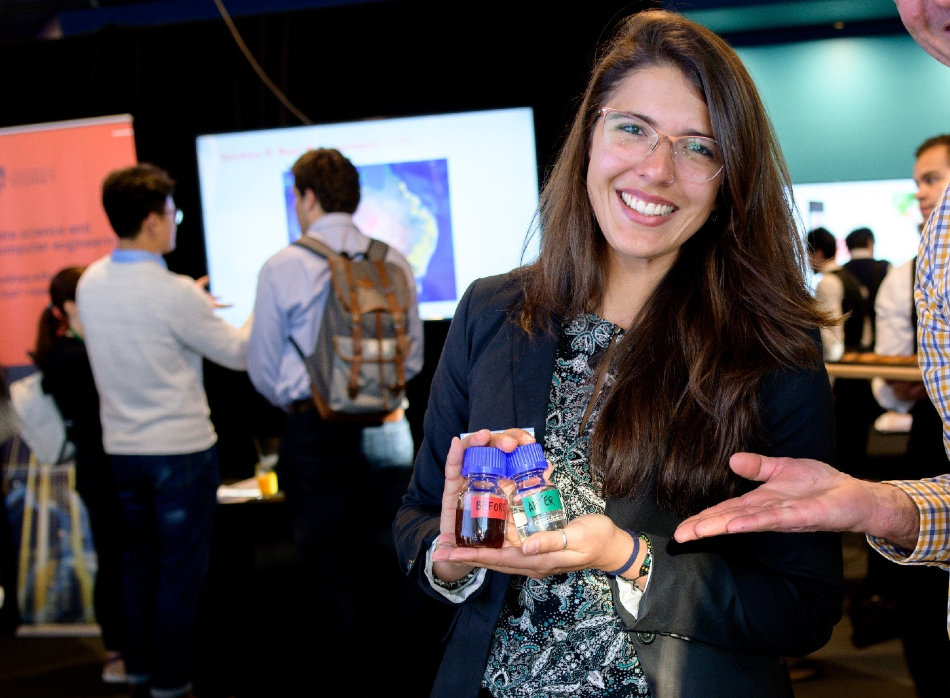Jul 8 2020
Engineers from the University of Sydney have developed a new method that involves using electricity to clean strongly polluted industrial wastewater. They believe that the results will assist pharmaceutical manufacturers, wineries, and other sectors that should meet strict wastewater regulations.
 Julia Ciarlini Jungers Soares showcasing her work at the University of Sydney. The researchers used an advanced oxidation process that eliminated stubborn organic aqueous pollutants. Image Credit: Julia Ciarlini Jungers Soares, University of Sydney
Julia Ciarlini Jungers Soares showcasing her work at the University of Sydney. The researchers used an advanced oxidation process that eliminated stubborn organic aqueous pollutants. Image Credit: Julia Ciarlini Jungers Soares, University of Sydney
The team from the School of Chemical and Biomolecular Engineering has designed an electrochemical oxidation method for cleaning complex wastewater consisting of a hazardous mixture of chemical pollutants.
Our study, published in Algal Research, involved industrial wastewater that had been heavily contaminated with a cocktail of organic and inorganic species during a biofuel production process.
Julia Ciarlini Jungers Soares, PhD, Chemical and Biomolecular Engineering, The University of Sydney
Soares completed his PhD under the supervision of Dr Alejandro Montoya.
The wastewater containing phosphorus, nitrogen, and carbon was produced in a pilot plant, which was developed by the researchers for producing biofuels by making use of the naturally abundant microalgae.
As part of the process, wastewater is treated using electricity with the help of specialized electrodes. Electricity is discharged and oxidation reactions are then induced near the surfaces of the electrode. This leads to the conversion of organic contaminants into safe gases, minerals or ions.
We have employed an incredibly powerful process that eliminates even the most persistent non-biodegradable pollutants, such as pharmaceuticals and pesticides, as well as various classes of organic compounds that can be found in many industrial effluents. The process is relatively simple, does not require the addition of chemicals or severe operation conditions, and does not produce additional waste streams.
Julia Ciarlini Jungers Soares, PhD, Chemical and Biomolecular Engineering, The University of Sydney
Soares continued, “Wastewater is a significant issue for our environment, as well as for many industries who use substantial volumes of water in their processes, such as in reactions, transport, and washing and cooling. Finding suitable solutions for reuse or disposal is often very challenging and costly.”
The electrochemical method that we used can be readily applied to industries that must comply with strict regulations for wastewater disposal, such as pulp and paper processing, wineries, as well as pharmaceutical production facilities.
Julia Ciarlini Jungers Soares, PhD, Chemical and Biomolecular Engineering, The University of Sydney
“Worldwide, researchers are investigating methods for the development of biofuels from algae. Developing alternatives for the treatment and reuse of this industrial effluent is a hot research topic and can bring opportunities for energy and resource recovery within a circular bio-economy framework,” added Soares.
The research team is planning to research particular contaminants to gain better insights into the chemical transformations that occur at the time of electrochemical oxidation, and will upscale the process.
According to a 2017 UNESCO report, there are vast chances of exploiting wastewater as a resource, and that securely managed wastewater is a sustainable and cost-effective source of nutrients, energy, water, and other retrievable materials.
Journal Reference:
Ciarlini, J., et al. (2020) Electrochemical oxidation of nitrogen-rich post-hydrothermal liquefaction wastewater. Algal Research. doi.org/10.1016/j.algal.2020.101919.